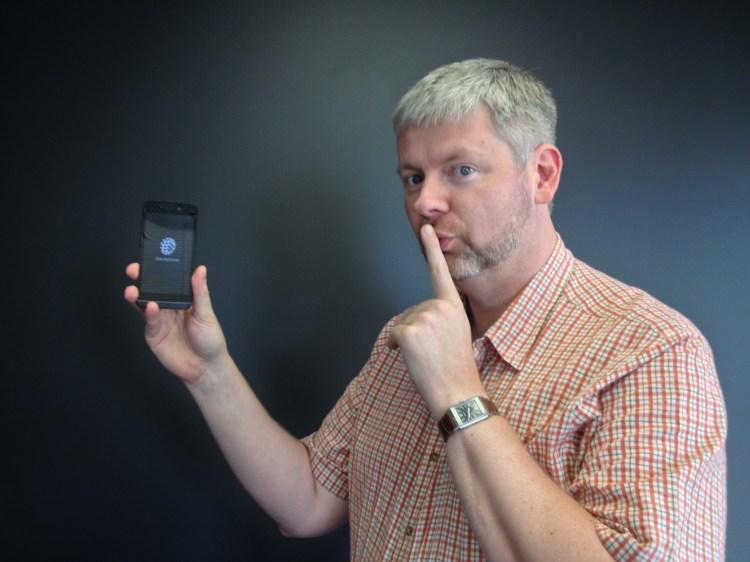There is, apparently, a big demand for commercially available encrypted smartphones perhaps impervious to the data demands of spy agencies and cyber criminals worldwide.
Indeed, Toby Weir-Jones says sales of his new ultra-encrypted smartphone, called the Blackphone, are flying off the shelves since it began officially shipping in June.
Weir-Jones, a former British Telecom executive, declined to release numbers. But he had envisioned a commercially available smartphone impervious to communication intercepts long before Edward Snowden’s leaks made encryption a household name. Weir-Jones said his company, SGP Technologies, is working hard to keep up with demand.
“It’s going quite well. There is a rekindling of the enterprise market. We have been shipping out of inventory,” Weir-Jones told VentureBeat.
At the heart of Blackphone is its new Android-centric operating system, called PrivatOS. The Blackphone comes with built-in industrial grade encryption that protects IMs, voice, video, and chat. The Blackphone is a joint collaboration between Silent Circle and Geeksphone; it took six months for SGP engineers to design and build.
The Blackphone is partly the brainchild of security guru Phil Zimmermann, perhaps best known as the inventor of the encryption tool PGP, which garnered raves with Usenet users when it was released in 1991. Blackphone is sexy and slim, with a 4.7-inch display, quad-core 2 GHz system-on-a-chip processor, and 1 GB of LPDDR RAM.
In addition, Blackphone comes with a gravity sensor, light sensor, proximity sensor, magnetic sensor, and GPS. Additional features include secure file and transfer storage and secure and private browsing. Blackphone’s Security Center also lets users customize data flows.
According to the Blackphone website:
“Blackphone combines a custom operating system with leading applications optimized for security. The result: an unparalleled product ideal for people who recognize a need for privacy and want a simple, secure place to start.”
So who’s buying it?
“People looking for a turn-key solution using it as a blackbox all in one package,” Weir-Jones said.
So far, private citizens looking for a little privacy, individual government employees, and BYOD afficionados are behind the sales surge, Weir-Jones said. Retailing for $629, the Blackphone comes unlocked, which means it will work with your provider no matter where you reside.
“There are government customers, but no contracts, individuals in different (government) departments buying it for their own internal use,” he said. “Frankly, these customers were already using Silent Circle apps,” before Blackphone was officially released.
SGP Technologies is in discussions with a number of cell carriers across the globe, Weir-Jones said, declining to name them. Any deal with a major carrier would be a tipping point for Blackphone’s access to the vast smartphone market. Blackphone was officially approved by Good Technologies, a Mobile Device Management provider, last week.
Weir-Jones, who based his SGP Technologies in Geneva with an international roster of engineers, has a background in enterprise security from his stint at British Telecom, where he specialized in crypto services.
The reported success of Blackphone has its genesis partly with Edward Snowden’s NSA document dumps to the Guardian, Washington Post, and Germany’s Der Spiegel media properties last year, in which it was disclosed how the agency had collected vast troves of data on smartphone users by back-ending data centers of the carriers themselves.
“There has been a remarkable convergence of of market opportunity and timing. Snowden crystalized the awareness of bulk surveillance. You don’t have to accept the status quo,” he said.
“He’s been a boon to the industry.”
Thus far, Blackphone has won rave reviews from the likes of MIT Technology Review and Endgadget. But we’re still waiting for our test unit.


